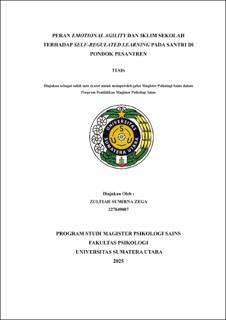| dc.contributor.advisor | Tarmidi | |
| dc.contributor.advisor | Nauly, Meutia | |
| dc.contributor.author | Zega, Zulfiah Sumirna | |
| dc.date.accessioned | 2025-03-24T04:55:40Z | |
| dc.date.available | 2025-03-24T04:55:40Z | |
| dc.date.issued | 2025 | |
| dc.identifier.uri | https://repositori.usu.ac.id/handle/123456789/102445 | |
| dc.description.abstract | The numerous subjects and dense schedules in modern Islamic boarding
schools present unique challenges for students. Students must be able to
learn independently in order to achieve the targets set by the boarding
school. This independent learning is referred to as self-regulated learning
(SRL). The inability of santri to learn independently will affect the learning
outcomes they achieve during their time at the boarding school. This study
examines the roles of (1) emotional agility on the growth pathway type and
well-being pathway type in SRL; (2) school climate on the growth pathway
type and well-being pathway type in SRL; (3) the roles of emotional agility
and school climate on the growth pathway type and well-being pathway
type in SRL among MTS (Madrasah Tsanawiyah) students in modern
Islamic boarding schools. The sample in this study consists of 350
individuals. The sampling technique used is non-probability, specifically
purposive sampling, and a Likert scale is used for data collection. The data
analysis employed is CFA for construct validity and multiple regression
using JASP 0.19.0. The results of the study indicate that (1) emotional
agility positively contributes to the improvement of the growth pathway
type in SRL but does not contribute to the well-being pathway type in SRL;
(2) school climate positively contributes to the improvement of both the
growth pathway type and the well-being pathway type in SRL; (3)
emotional agility and school climate positively influence both types of SRL.
This study shows that enhancing emotional agility among santri and
creating a positive school climate can help santri in performing self-
regulated learning in both the growth pathway and well-being pathway
types. | en_US |
| dc.language.iso | id | en_US |
| dc.publisher | Universitas Sumatera Utara | en_US |
| dc.subject | Self-regulated Learning | en_US |
| dc.subject | Emotional Agility | en_US |
| dc.subject | School Climate | en_US |
| dc.subject | Santri | en_US |
| dc.subject | Modern Islamic Boarding Schools | en_US |
| dc.title | Peran Emotional Agility dan Iklim Sekolah terhadap Self-Regulated Learning pada Santri di Pondok Pesantren | en_US |
| dc.title.alternative | The Role of Emotional Agility and School Climate on Self-Regulated Learning among Students in Islamic Boarding Schools | en_US |
| dc.type | Thesis | en_US |
| dc.identifier.nim | NIM227049007 | |
| dc.identifier.nidn | NIDN0007068001 | |
| dc.identifier.nidn | NIDN0027116703 | |
| dc.identifier.kodeprodi | KODEPRODI73101#Psikologi Sains | |
| dc.description.pages | 262 Pages | en_US |
| dc.description.type | Tesis Magister | en_US |
| dc.subject.sdgs | SDGs 4. Quality Education | en_US |


